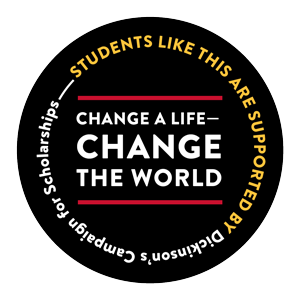Raising the Roof on Sustainability Research

Student Snapshot: Lucy Stott '27
Lucy Stott ’27 is learning the value of hands-on learning and interdisciplinary problem-solving. Her summer 2024 research—collecting and analyzing data on Tome Hall’s green roof—tapped both of her majors, sharpened useful skills and helped prepare her for a change-making career.
New York, N.Y.
Majors:
Quantitative economics & environmental studies.
Honors/scholarships/awards:
Presidential Scholarship.
Clubs and organizations:
Delta Nu (treasurer), Environmental Majors Committee (treasurer) and Economics Major Committee.
Best thing about my Dickinson experience so far:
The best part of my Dickinson experience has been meeting such interesting people—both fellow students and faculty members. I have really been enriched by and have enjoyed interacting with people from all over the country and world.
On choosing Dickinson:
Many factors went into my decision to attend Dickinson, including the college’s unwavering commitment to sustainability, the small school environment and its incredible opportunities for studying abroad. But what sealed the deal for me was when I went on my campus tour and could truly see what it was like to be a Dickinson student.
I saw firsthand what a special, close-knit community Dickinson truly is, and that made me incredibly excited to become a part of it. I was also honored to be selected for the Presidential Scholarship, which has given me the opportunity to join an extraordinary group of students, connect with alumni and participate in conversations with President Jones and the school administration.
Favorite class so far:
Introduction to Arctic Studies (GEOS250) with Professor of Geosciences Ben Edwards. For my final project, I wrote a research paper, “Economic and Food Adaptation Strategies of Arctic Indigenous Communities Facing Climate Change.” I loved the flexibility of being able to pick such an interdisciplinary topic that combined both of my academic interests: economics and environmental studies. We also had an incredible guest speaker, Dr. Katherine Hayhoe. We learned the basics of invaluable Geographic Information System skills.
Favorite professor:
While I’ve had so many incredible professors, Assistant Professor of Environmental Studies Allyssa Decker has made an incredible impact on my college career. I’ve taken both Environmental Connections (ENST161) and Urban Ecology (ENST305) with her, and I also conducted student-faculty research alongside her last summer. I’m inspired by her willingness to support students both inside and outside the classroom and push students to reach their full potential. And her humor and down-to-earth demeanor makes lectures incredibly enjoyable. She constantly reminds me how much I love my major!
Post-Dickinson plans:
Ideally, pursue a master’s degree in environmental economics and then a career related to sustainability!
About my research:
This past summer, I conducted research alongside Professor Decker on the Tome rooftop, tracking changes in vegetative cover to investigate which substrates optimize plant performance on green roofs using two primary methods. First, we conducted a water-retention experiment that involved drying, saturating, draining, weighing the substrates and measuring retained water. This helped us compare retention rates of both substrates and find out which would be more optimal on the roof.
We also used Adobe Photoshop to analyze the change in vegetative cover over eight weeks. Weekly overhead photographs of the 36 trays on the roof were taken, and Photoshop was then used to match colors and calculate percent coverage. Then the data was analyzed through Excel. An unexpected finding was the drastic decrease in vegetative coverage, up to 6%, during the heatwave Pennsylvania endured last July. This highlighted the vulnerability of the vegetation to extreme weather conditions and emphasized the importance of mitigating climate change.
What I learned through this experience:
This research provided me with practical insights into sustainable practices and environmental management. The hands-on experience of data collection and analysis has deepened my understanding of the practical challenges of implementing green infrastructure and has enhanced my data-analysis and Excel skills. Looking ahead, this research gave me a glimpse of a career in sustainable infrastructure and the importance of interdisciplinary approaches, which will undoubtedly help me solve complex real-world environmental problems in my future career.
Most important thing I’ve learned so far:
If you are in a bad mood, go for a walk. If you are still in a bad mood, go for another walk.
Read more Student Snapshots.
TAKE THE NEXT STEPS
Published March 14, 2025
